Earlier this year, Jobs for the Future (JFF) issued a policy brief, “No Dead Ends: How Career and Technical Education Can Provide Today’s Youth With Pathways to College and Career Success.” This resource aligns with the current vision for the future of Career Technical Education (CTE), Without Limits: A Shared Vision for the Future of Career Technical Education where each learner is able to navigate their journey to career success without limits.
“No Dead Ends” offers a series of federal and state policy considerations that are informed by the insights of leading secondary and postsecondary practitioners. The brief also spotlights several states with strong policy conditions.
Advance CTE spoke with college and career pathways expert Nancy Hoffman of JFF to learn more about the report. Below, she shares her reflections, research, and policy recommendations for how state and local CTE leaders can realize the mindset of “without limits.”
The Advance CTE team encourages members to draw on the ideas and evidence in this blog to advance aims around equity, economic mobility, and systems alignment.
Advance CTE: It’s great to speak with you, Nancy. Can you share what a “without limits” vision means to you and how it ties into JFF’s call for “no dead ends”?
 Nancy Hoffman: The first time I heard the phrase “no dead ends” was in 2005 on a tour of Switzerland’s vocational education and training (VET) system. Swiss VET engages the majority of Swiss teenagers in a mix of school and paid apprenticeships with two to three days of paid work each week. The VET system is designed to provide youth with multiple pathways (see graphic and page 6 of this report). All progression routes are open to all youth “without limits” as aligned with the CTE Without Limits vision, and the system is “permeable,” meaning there are “no dead ends” to pathways that a 15-year-old VET student chooses. Career exploration begins early with all middle schoolers spending a week with an employer in an occupation of interest. Students get help understanding choices in the school curriculum as well as in each town’s career advising center. The apprentice may end up, as many do, with a bachelor’s degree from a university of applied sciences, even a Ph.D., and may change from one field or company to another.
Nancy Hoffman: The first time I heard the phrase “no dead ends” was in 2005 on a tour of Switzerland’s vocational education and training (VET) system. Swiss VET engages the majority of Swiss teenagers in a mix of school and paid apprenticeships with two to three days of paid work each week. The VET system is designed to provide youth with multiple pathways (see graphic and page 6 of this report). All progression routes are open to all youth “without limits” as aligned with the CTE Without Limits vision, and the system is “permeable,” meaning there are “no dead ends” to pathways that a 15-year-old VET student chooses. Career exploration begins early with all middle schoolers spending a week with an employer in an occupation of interest. Students get help understanding choices in the school curriculum as well as in each town’s career advising center. The apprentice may end up, as many do, with a bachelor’s degree from a university of applied sciences, even a Ph.D., and may change from one field or company to another.
While the United States has come a long way in embracing a new narrative about career and technical education (CTE), dismissive attitudes remain. Unlike in Switzerland, our public discourse separates going to college from career preparation, despite the fact that everyone goes to college to get a career—whether pursuing an industry certification or a Ph.D. JFF’s No Dead Ends publication takes a hard look at how to remove the remaining stigmas seen in policy, in practice, and in the public perception that CTE students are “not college material” and are in a “remedial” pathway that will lead to jobs with low wages demanding only basic skills.
To continue to move CTE perceptions in a positive direction, the JFF brief requires action on three levers: higher visibility for CTE, better allocation of resources, and incentives that reward CTE programs in the same way as Advanced Placement, International Baccalaureate, and other such markers of readiness for postsecondary education. No Dead Ends also demands that all programs for college and career preparation be assessed with an equity lens. Ironically, the institutional racism that historically funneled students of color and low-income students into CTE is now shutting them out in some states. In many regions, CTE is becoming an attractive way for privileged students to get hands-on experience in high tech, engineering, health care, and the like.
Advance CTE: JFF’s No Dead Ends report emphasizes the importance of “career identity,” which corresponds to Principle 3, “Each Learner Skillfully Navigates Their Own Career Journey.” What does career identity mean, and how can it be supported for each learner?
Nancy Hoffman: As we have come to learn, career advising is not the same as supporting a young person’s journey to career or vocational identity. At JFF, we define career identity as the link between a person’s motivations, interests, and competencies and their potential career roles.
Child development researcher Dr. Robert Halpern has written extensively on the need for schools to nurture the vocational identities of teenagers. He notes how little support most schools provide in helping young people “attend to their vocational selves: to confirm and disconfirm interests; think about and understand vocation (and vocational knowledge) in deeper, more differentiated ways; learn about vocational possibilities and understand what it means to be prepared for specific kinds of work; and understand how to prepare for work and the length of time that requires.” Halpern put it, “When thinking about career paths, young people are asking not simply ‘what do I want to do?’ but ‘who do I want to be?” Young people begin to ask such questions as early as middle school, but most middle school curriculum does not integrate the study of careers and career exploration into the curriculum. Indeed, this gap inspired JFF to create Possible Futures, a program for grades 6 through 10 that provides a fun and engaging career exploration program, helping young people gain the foundational knowledge, skills, and experiences they need to make critical decisions about their future with confidence.
Advance CTE: No Dead Ends tackles how to make sure all high-quality pathways are accessible to each learner. Looking through an equity lens, what issues commonly arise with CTE generally and work-based learning experiences, more specifically?
Nancy Hoffman: As the Gates Foundation’s Striving to Thriving project powerfully documented through thousands of interviews, Black and Latinx young people see their race or ethnicity as an asset. Yet our education and employment systems are sending them contradictory signals about what their proper aspirations ought to be, where they will be welcomed, and most important, whether they will be welcomed for who they are.
As researcher Nat Malkus notes, schools may fail to notice the “hidden tracking” within CTE. Students headed to four-year colleges tend to enroll in what Malkus calls “New Era CTE” (e.g. computer science, engineering, health care) and students wanting a certification or unsure of their next steps, are guided toward traditional trades course– not all of which provide access to well-paying jobs. The distribution of students within CTE can mirror the domination of an occupation by a particular race/ethnicity, gender, or other personal characteristic. This means, for example, populating IT and computer science courses with college-bound white males, while young women of color take internships in helping professions.
Local and state leaders must be alert to sorting mechanisms within CTE. Do privileged students get the high-tech internships while low-income students take on jobs where there may be a lot to learn? And then do they continue on such a path to a career that almost guarantees low wages? Equity gaps widen especially when schools lack a placement system and ask students to find their own employer-supported internship. Most challenging is how schools identify, respond to, and take action to prevent placing students in unwelcoming or even racist workplaces or unwittingly reinforcing occupational segregation. A recent JFF blog, “Identifying the ‘Fruit and Root’ of Systemic Racial Inequity,” notes the pernicious use of the word “fit,” which can be a cover for racism, as in “she won’t fit into our company’s culture.” The authors argue that “the seemingly neutral concern about “fit” has proven to be problematic, and tends to cover for a preference for a homogenous culture in the workplace. Employers want to hire people of color, but the people of color they hire are subtly forced to conform to existing norms—of dress, behavior, speech–to truly belong.”
Advance CTE: No Dead-Ends lays out several key policy considerations for strengthening college and career pathways, supporting career identity developing, and expanding access to high-quality work-based learning experiences. To conclude our conversation, could you share a couple of these policy recommendations?
Nancy Hoffman: Defining a high-quality CTE program is a foundational step for developing state systems that better serve learners. In No Dead Ends, JFF suggests that states should consider clearly articulating key quality standards for “fundable” CTE programs. States should also consider tying funding eligibility to these quality standards to ensure resources are used effectively. For example, Delaware not only created a statewide definition of CTE but required each program of study to adhere to three key principles: (1) prepare students for career success and post-secondary education; (2) align with workforce needs and are developed in partnership with relevant stakeholders; and (3) improve student achievement by connecting academic and career success measures. However, states don’t need to reinvent the wheel. Perkins V has a good definition for CTE, and states can use that as a jumping-off point to ensure high-quality programming.
In the brief, JFF also recommends that the federal government define career identity development and give states guidance on how to operationalize this aim. Current definitions coming out of the U.S. Department of Education’s Office of Career Technical and Adult Education (OCTAE) note that a high-quality program of study includes career and academic guidance. However, while advising is critical, policy must more deeply encourage the development of career identity which should be framed as a key aspect of adolescent development overall. When Perkins is reauthorized in a few years, JFF believes the law should include a definition of this term, and OCTAE should release clearer guidance. These efforts will help promote more robust college and career coaching for students.
Visit Advance CTE’s website to learn more about the CTE Without Limits vision, and the Learning that Works Resource Center for more guidance on advancing equity in CTE experiences.
Nancy Hoffman, JFF and Stacy Whitehouse, Advance CTE
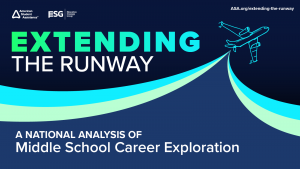 In recent years, middle school career exploration has gained traction as a foundational element of Career Technical Education (CTE). As many State CTE Directors and leaders know, the Carl D. Perkins Career and Technical Education Act (Perkins V), signed into law in July 2018, for the first time permitted Perkins funding to be used on career exploration programming as early as fifth grade. Here are four strategic actions that states can take to expand and enhance career exploration programs that prepare learners for postsecondary education and career success, based on a recent nationwide study of middle school career exploration programs, commissioned by American Student Assistance® (ASA).
In recent years, middle school career exploration has gained traction as a foundational element of Career Technical Education (CTE). As many State CTE Directors and leaders know, the Carl D. Perkins Career and Technical Education Act (Perkins V), signed into law in July 2018, for the first time permitted Perkins funding to be used on career exploration programming as early as fifth grade. Here are four strategic actions that states can take to expand and enhance career exploration programs that prepare learners for postsecondary education and career success, based on a recent nationwide study of middle school career exploration programs, commissioned by American Student Assistance® (ASA).


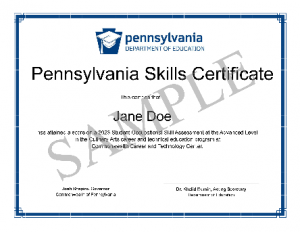 State CTE leaders utilize data as feedback to continuously improve systems, celebrate high-quality programs, and target areas for improvement. For example, the Pennsylvania Department of Education (PDE) utilizes NOCTI/NBS assessments and data for various purposes, including program evaluation, curriculum alignment, instructional improvement, professional development, and accountability. Learners meeting state-established benchmarks are eligible for the Pennsylvania Skills Certificate (PSC), recognizing individual advanced technical skill achievement.
State CTE leaders utilize data as feedback to continuously improve systems, celebrate high-quality programs, and target areas for improvement. For example, the Pennsylvania Department of Education (PDE) utilizes NOCTI/NBS assessments and data for various purposes, including program evaluation, curriculum alignment, instructional improvement, professional development, and accountability. Learners meeting state-established benchmarks are eligible for the Pennsylvania Skills Certificate (PSC), recognizing individual advanced technical skill achievement. High-quality CTE systems involve business/industry partners in verifying skills, ensuring learner assessments accurately reflect expertise. This practice not only benefits learners but also provides industry employees with an opportunity to contribute meaningfully to CTE schools and programs. As one evaluator recently summarized, “I am always willing to set time aside to work with these learners and programs, as this is the future of my industry–one that I care about and want to impact.”
High-quality CTE systems involve business/industry partners in verifying skills, ensuring learner assessments accurately reflect expertise. This practice not only benefits learners but also provides industry employees with an opportunity to contribute meaningfully to CTE schools and programs. As one evaluator recently summarized, “I am always willing to set time aside to work with these learners and programs, as this is the future of my industry–one that I care about and want to impact.”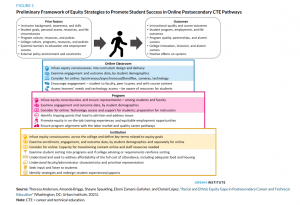
 Overview
Overview 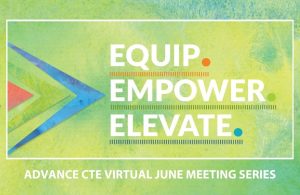 Over the course of three Wednesdays this month, we hosted our virtual June Meeting Series. Hundreds of Career Technical Education leaders from coast to coast tuned in for afternoon-long conversations focused on the themes
Over the course of three Wednesdays this month, we hosted our virtual June Meeting Series. Hundreds of Career Technical Education leaders from coast to coast tuned in for afternoon-long conversations focused on the themes  One practical tip Dennis offered: “Start your email subject line with the words ‘STORY IDEA.’” Something that simple can make him jump right to the email.
One practical tip Dennis offered: “Start your email subject line with the words ‘STORY IDEA.’” Something that simple can make him jump right to the email. 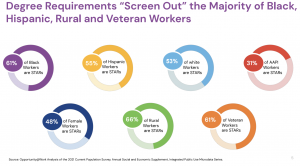
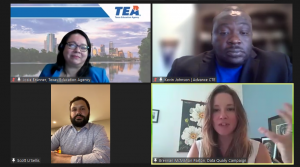

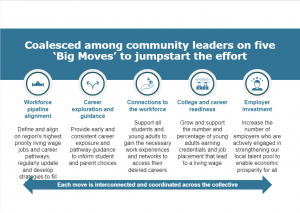 Dallas Foundation Chief Impact Officer Drexell Owusu was candid about the equity and quality of life challenges facing residents of Dallas. However, he was equally optimistic about the role that CTE can have in providing high-quality pathways to maximize recent economic growth and increase the number of young adults achieving a living wage to 50 percent within one generation. He identified five strategies that comprise the Dallas Thrives initiative to achieve this goal.
Dallas Foundation Chief Impact Officer Drexell Owusu was candid about the equity and quality of life challenges facing residents of Dallas. However, he was equally optimistic about the role that CTE can have in providing high-quality pathways to maximize recent economic growth and increase the number of young adults achieving a living wage to 50 percent within one generation. He identified five strategies that comprise the Dallas Thrives initiative to achieve this goal. 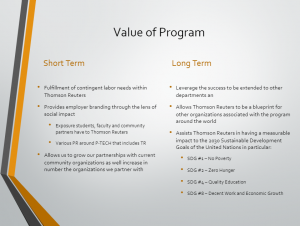 Thomson Reuters Director of Community Relations
Thomson Reuters Director of Community Relations 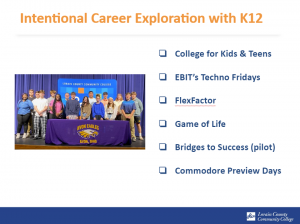 Lorain County Community College Manager of Career Technical Pathways & Programs
Lorain County Community College Manager of Career Technical Pathways & Programs 
 This week President Biden signed a full-year spending package for the current fiscal year, providing several increased investments of note to the Career Technical Education (CTE) community. In addition, Advance CTE continues to encourage its members and partners to support legislation to improve learner access to Pell Grants for high-quality, short-term postsecondary CTE programs. Finally, be sure to encourage your Senators and Representatives to join the House and Senate CTE Caucuses if they have not already done so!
This week President Biden signed a full-year spending package for the current fiscal year, providing several increased investments of note to the Career Technical Education (CTE) community. In addition, Advance CTE continues to encourage its members and partners to support legislation to improve learner access to Pell Grants for high-quality, short-term postsecondary CTE programs. Finally, be sure to encourage your Senators and Representatives to join the House and Senate CTE Caucuses if they have not already done so!